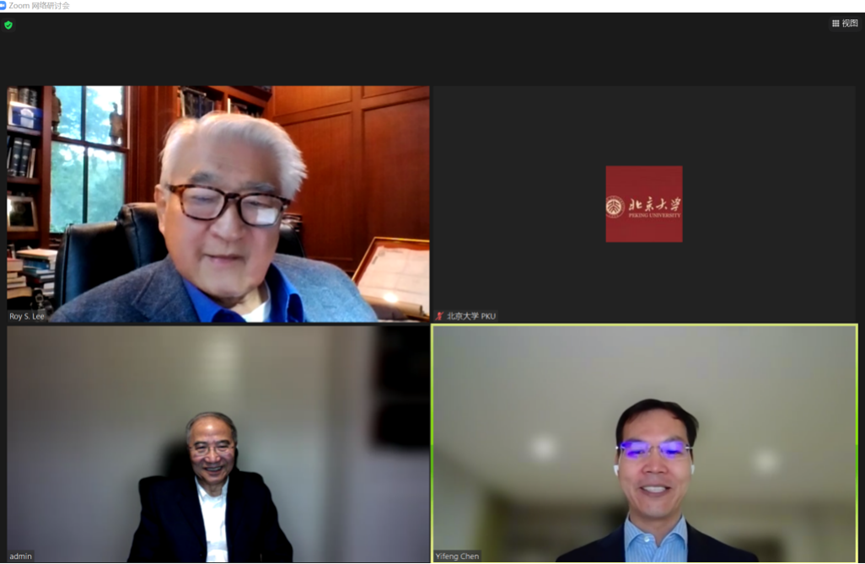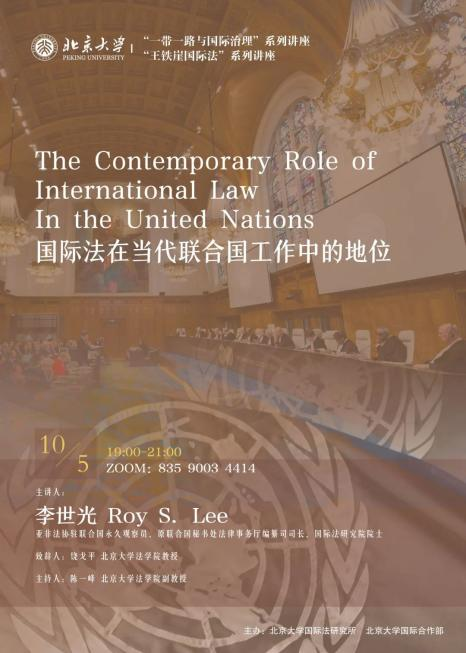The lecture series of "the Belt and Road and International Governance" and "Wang Tieya International Law" - "The Status of International Law in the Work of the Contemporary United Nations" were successfully held
Date:2022-10-14
On the evening of October 5, 2022, the series of lectures on "the Belt and Road and International Governance" and "Wang Tieya International Law" - "The Status of International Law in the Work of the Contemporary United Nations" of Peking University were successfully held online. The lecture was delivered by Dr. Roy S. Lee, permanent observer of AALCO to the United Nations, director of the Codification Division of the former Office of Legal Affairs of the United Nations Secretariat, and academician of the Academy of International Law. Associate Professor Chen Yifeng took the chair, , and Professor Rao Geping was invited to deliver a speech.

Dr. Roy S. Lee worked in the United Nations Secretariat from 1967 to 1998, dealing with legal and policy issues related to human rights issues, coastal areas, economic and technological issues and the law of the sea, the International Court of Justice, environmental law, treaty making, international humanitarian law and dispute settlement.
Before the lecture, Prof. Rao Geping delivered a welcoming speech on behalf of Peking University's international law research. Mr. Rao introduced that Dr. Roy S. Lee once served as the third director of the Institute of International Law of Peking University and made important contributions to the teaching and internationalization of international law of Peking University. On behalf of the teachers and students of international law major, Prof. Rao Geping welcomed and thanked Dr. Roy S. Lee for his lecture.
In this lecture, Dr. Roy S. Lee paid attention to the difficulties faced by the International Law Commission and the Sixth (Legal) Committee of the General Assembly of the United Nations in their work in recent years and the causes. At the same time, Dr. Roy S. Lee pointed out that even if some of the draft articles drafted by the International Law Commission in recent years had not officially become conventions, they could also serve as important sources of information on international law. The Sixth (Legal) Committee of the United Nations General Assembly and its members are more inclined to reach agreement on procedural issues, which makes it difficult to make substantive progress on relevant issues.
The audience had a positive exchange with Dr. Roy S. Lee. Dr. Roy S. Lee responded to questions such as "the status and role of developing countries in the development of international law", "the neutral status of members of the International Law Commission", and "the model and role of group negotiations".
At the end of the lecture, Pro. Rao Geping summarized the lecture. With the theme of "the status of international law in the work of the United Nations today", this lecture elaborated on the difficulties faced by the International Law Commission and the Sixth (Legal) Committee of the United Nations General Assembly and their causes, attracted more than 100 teachers and students from both inside and outside the school, received a warm response and achieved a complete success.

Translated by: Tu Wanting
Edited by: Meng Zihan



